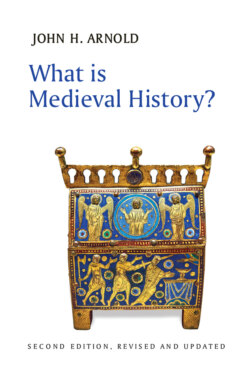What is Medieval History?

Реклама. ООО «ЛитРес», ИНН: 7719571260.
Оглавление
John H. Arnold. What is Medieval History?
CONTENTS
List of Figures
Guide
Pages
What is History? series
What is Medieval History?
Dedication
Preface to the Second Edition
Preface and Acknowledgements
1 Framing the Middle Ages. A Medieval Tale
Medievalisms and Historiographies
The Politics of Framing
Notes
2 Tracing the Middle Ages. Polyphony or Cacophony?
Editions and Archives
Using Documents
Chronicles
Charters
Images
Legal Records
Notes
3 Reading the Middle Ages
Anthropology
Numbers and Statistics
Archaeology, Science and Material Culture
Texts and Cultural Theory
Notes
4 Debating the Middle Ages
Ritual
Social Structures
Globalisms
Cultural Identities
Power
Notes
5 Making and Remaking the Middle Ages
Notes
Further Reading. Chapter 1 Framing the Middle Ages
Chapter 2 Tracing the Middle Ages
Chapter 3 Reading the Middle Ages
Chapter 4 Debating the Middle Ages
Chapter 5 Making and Remaking the Middle Ages
Index. A
B
C
D
E
F
G
H
I
J
K
L
M
N
O
P
R
S
T
U
V
W
Z
POLITY END USER LICENSE AGREEMENT
Отрывок из книги
Peter Burke, What is Cultural History? 2nd edition Peter Burke, What is the History of Knowledge? John C. Burnham, What is Medical History? Pamela Kyle Crossley, What is Global History? Pero Gaglo Dagbovie, What is African American History? Shane Ewen, What is Urban History? Christiane Harzig and Dirk Hoerder, with Donna Gabaccia, What is Migration History? J. Donald Hughes, What is Environmental History? 2nd edition Andrew Leach, What is Architectural History? Stephen Morillo with Michael F. Pavkovic, What is Military History? 3rd edition James Raven, What is the History of the Book? Sonya O. Rose, What is Gender History? Barbara H. Rosenwein and Riccardo Cristiani, What is the History of Emotions? Hannu Salmi, What is Digital History? Brenda E. Stevenson, What is Slavery? Jeffrey Weeks, What is Sexual History? Richard Whatmore, What is Intellectual History? Merry E. Wiesner-Hanks, What is Early Modern History?
John H. Arnold
.....
The kings without any authority, the nobles without any constraint, the peoples enslaved, the countryside covered with fortresses and ceaselessly ravaged, wars kindled between city and city, village and village … all commerce and all communications cut off … the grossest ignorance extending over all nations and all occupations! An unhappy picture – but one which was only too true of Europe for several centuries.4
As the last century of study has amply demonstrated, Turgot’s caricature of the middle ages is grossly distorted. But its spirit continues to reside: we, no less than Enlightenment philosophes, tend to look down as we look back, feeling at a gut level that something from the middle ages must be basic, crude and probably nasty. They believed the earth was flat, didn’t they? (No, that’s a later myth.) They burnt witches, didn’t they? (Not very often, that was mostly in the seventeenth century.) They were all ignorant, weren’t they? (No, there is substantial intellectual culture visible in Carolingian times, there were universities across Europe from the thirteenth century, and the beginnings of experimental science, among other things.) They never left home, hardly knew the world around them, right? (No, there were trade networks connecting Scandinavia, central Europe, the Middle East and North Africa.) But, surely, they behaved barbarically: constant local violence, waging wars against people they didn’t like, torturing people, executing criminals? (And none of this happens today?)
.....